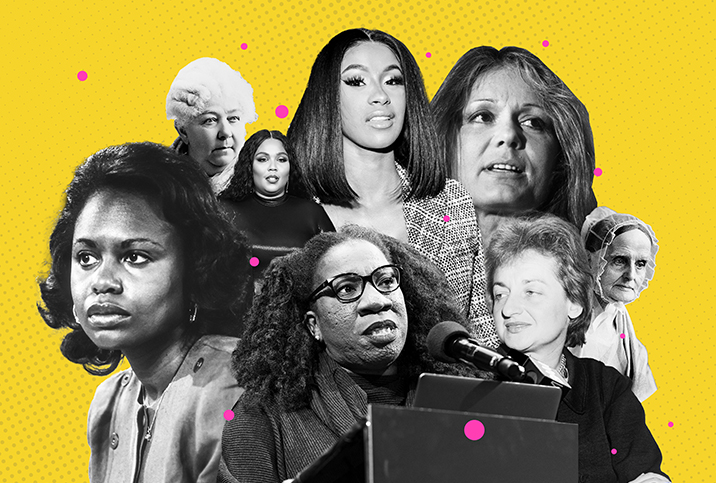If You Internalize Misogyny, It May Limit Your Sexual Satisfaction

In a 10-minute conversation, pairs of women use internalized sexist language an average of 11 times, according to a 2009 study.
Whether it's using phrases such as "I'm not like other girls" or "I don't hang out with women because they're too much drama," or terms like "b---h" or "chick," internalized misogyny comes in many forms. It often revolves around competitive commentary, self-objectification, accepting traditional gender roles and placing men's sexual gratification as a top priority.
Many women internalize misogyny as a natural response and maladaptive coping strategy to a patriarchal society in which many women face sexism and oppression. Sexism is often a daily occurrence for women, as external and internal oppression can result in shame, confusion and feelings of powerlessness and inferiority. The culmination of internalizing these beliefs occurs when women start to place negative views on their group and status.
Internalized stereotypes and gender-based discrimination also teach women, consciously and subconsciously, that men's sexual needs come before women's. By relying on societal gender expectations and attitudes, women are less likely to ask for sexual pleasure, thus, decreasing orgasm frequency.
The cycle of internalized misogyny
Everyday sexism has profound implications in women's lives, shaping their personality and identity. Specifically, between the ages of 11 and 14, girls are more likely to internalize sexism due to increasing pressure to conform to adult female norms.
Internalized sexism begins with the reduction of power. For young girls, feelings of powerlessness and incompetence begin with perceiving more men in power. Young girls and women see a majority of men in what society deems as high-powered positions, such as the president (100 percent), Fortune 500 CEOs (86 percent), doctors (64 percent) and other male-dominated professions.
By perceiving and believing gender correlates to incompetence, young girls begin to internalize societal inequalities, resulting in changes in behavior and feelings toward themselves and other women.
Shanna Monahan, a sex therapist and licensed counselor based in Frisco, Texas, attributes internalized misogyny to external perceptions of women.
"When a woman has internalized misogyny, she will display behavior that shows she has separated herself from feminine traits," Monahan explained. "What we're now calling 'pick me' behavior demonstrates how she is 'not like other girls,' casting feminine traits in a negative light. Examples include prioritizing male beauty standards and seeking to downplay any problems she might have so that she won't be seen as emotional."
Other examples include competition between women, objectification and following traditional roles in relationships.
Prioritizing men's sexual gratification
Women who internalize benevolent sexism—believing men are driven by sex, making it their right and a woman's duty—are reported to have sex for relational reasons rather than pleasure. Jacqueline Sherman, Ph.D., an intimacy and relationship coach, and psychologist based in Jacksonville, Florida, said this is a prime example of how women are taught to prioritize men's gratification.
"Many women have learned from societal conditioning that sex is for male pleasure," Sherman said. "It is learned that a woman's role is to give pleasure to her male partner, not to receive it. As a result, many women who have sex with men put their pleasure on the back burner. Women may be silent or hesitant to advocate for what pleasures them and helps them orgasm."
Additionally, women who internalize benevolent sexism are less likely to be sexually assertive. As a result of the reluctance to ask their partner for pleasure, they're less likely to consistently orgasm.
"We learn from society that men should be in control during sex," Sherman said. "Women can feel uncomfortable dominating in the bedroom, which leads to them shutting off their wants, desires and fantasies. It can be difficult for women to unlearn toxic messaging and view their pleasure as imperative."
Combating internalized sexism during sex
It's difficult to unlearn the gender roles and standards implemented by a patriarchal society. However, understanding internal misogyny and how it impacts relationships is a start.
"The first step is awareness," Sherman explained. "Many women do not know that internal misogyny exists. The more we have conversations about it, the better we will be as a society and with intimacy in general. Intimacy is about vulnerability at the core, so when we can get honest that this concept exists, it will deepen the conversation around sex."
Conversations about sex may be difficult for women who face sexual shame in a society with a double standard that often rewards men and shames women for sexual conduct. However, learning to be comfortable talking about sexual needs can be as easy as being honest with yourself.
"Let's be clear," Monahan said. "The answer is not to learn to approach sex as a man does. A woman needs to ask herself, outside of intimacy, in what ways has she demonized her feminine traits and how can she allow herself to reintegrate them. As she begins to gain insight into this, she will start to feel the permission to assert her needs and feelings, and ask for what she needs sexually."
How other factors can help counter misogyny
Gender roles, stereotypes, active discouragement and casual sexism in everyday life make women more likely to internalize misogyny. Higher levels of sexism in men can also result in fewer conversations surrounding women's pleasure.
"For the male partners, they can help combat misogyny by learning to see feminine traits as valid all on their own and not view male traits as the 'normal' that she should aspire to," Monahan said. "Healthy partners will be able to listen, understand and change to make their partners feel safe and valued."
Internalized misogyny occurs as a result of a patriarchal society. Without changes to the current structure of gender normativity and expectations, women will continue to internalize the societal sexism and sexual shame placed on them.
Until then, disrupting sexism looks like speaking out against sexist behaviors and gender stereotypes and educating others about oppressive language and behavior.


















